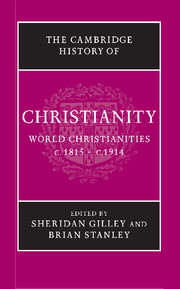Book contents
- Frontmatter
- 1 Introduction
- PART I CHRISTIANITY AND MODERNITY
- PART II THE CHURCHES AND NATIONAL IDENTITIES
- PART III THE EXPANSION OF CHRISTIANITY
- 26 African-American Christianity
- 27 Christian missions, antislavery and the claims of humanity, c.1813–1873
- 28 The Middle East: western missions and the Eastern churches, Islam and Judaism
- 29 Christians and religious traditions in the Indian empire
- 30 Christianity in East Asia: China, Korea and Japan
- 31 Christianity in Indochina
- 32 Christianity as church and story and the birth of the Filipino nation in the nineteenth century
- 33 Christianity in Australasia and the Pacific
- 34 Missions and empire, c.1873–1914
- 35 Ethiopianism and the roots of modern African Christianity
- 36 The outlook for Christianity in 1914
- Select General Bibliography
- Chapter Bibliography
- Index
- References
35 - Ethiopianism and the roots of modern African Christianity
from PART III - THE EXPANSION OF CHRISTIANITY
Published online by Cambridge University Press: 28 March 2008
- Frontmatter
- 1 Introduction
- PART I CHRISTIANITY AND MODERNITY
- PART II THE CHURCHES AND NATIONAL IDENTITIES
- PART III THE EXPANSION OF CHRISTIANITY
- 26 African-American Christianity
- 27 Christian missions, antislavery and the claims of humanity, c.1813–1873
- 28 The Middle East: western missions and the Eastern churches, Islam and Judaism
- 29 Christians and religious traditions in the Indian empire
- 30 Christianity in East Asia: China, Korea and Japan
- 31 Christianity in Indochina
- 32 Christianity as church and story and the birth of the Filipino nation in the nineteenth century
- 33 Christianity in Australasia and the Pacific
- 34 Missions and empire, c.1873–1914
- 35 Ethiopianism and the roots of modern African Christianity
- 36 The outlook for Christianity in 1914
- Select General Bibliography
- Chapter Bibliography
- Index
- References
Summary
No fire without smoke: the texture of colonial Christianity as the backdrop to Ethiopianism
Certain forces from the home bases of missionaries combined with the emergent modes of African appropriation to reshape the face of African Christianity in the period from 1885 to the First World War. The Berlin Conferences of 1884–5 that initiated the partition of Africa by the European powers had an enormous effect on the relationship between the white missionaries and the Africans. The impact of colonial rule brought the gospel down to the grassroots and gave missionaries new opportunities to attempt to domesticate their values in African cultural terrains. Africans responded by weaving Christian strands of their own. Similarly, the World Missionary Conference of 1910 endeavoured to reformulate a new vision of the missionary enterprise even though it had no powers of enforcement. The dominant note of ecumenical consolidation of the vision kept the missionary spirit alive in the midst of growing institutionalisation, rivalry within the enterprise, the resilience of primal cultures, and the rising powers of the colonial state.
Partition introduced virulent forms of European nationalism into the continent. The mission churches embellished this spirit with denominational stripes. The Berlin Conference’s demand for physical presence rather than mere declarations of areas of influence opened the African interior to missionary gaze. It was a moot point whether colonies were acquired in a fit of official absent-mindedness or by the machinations of the men-on-the-spot; the character of the cross-cultural process changed. European self-confidence replaced the initial respect for African chiefs as colonial weaponry was now at the behest of gospel bearers. The scale of missionary activities was enormously enlarged, making analysis complex; competition among missionaries became rife: broadly, Catholics squared off against Protestants but there were intramural competitions among the Catholic orders and Protestant denominations because they came from different nations. Sometimes rivalry determined the pace, direction and nature of the Christian presence.
- Type
- Chapter
- Information
- The Cambridge History of Christianity , pp. 576 - 592Publisher: Cambridge University PressPrint publication year: 2005
References
- 4
- Cited by



